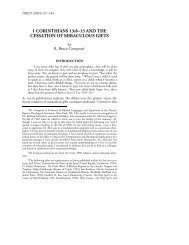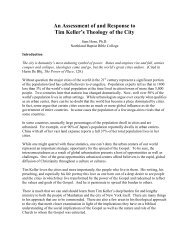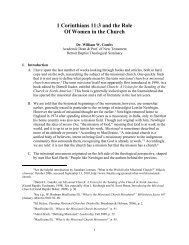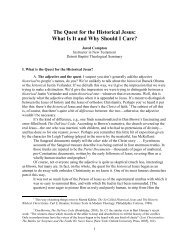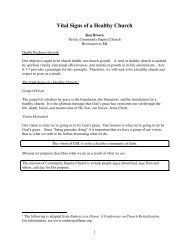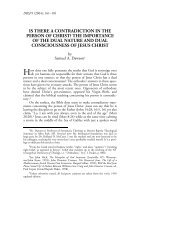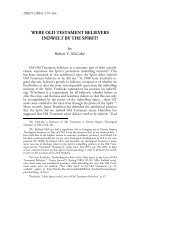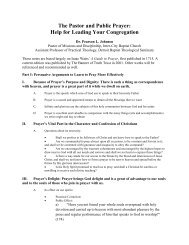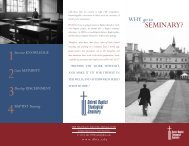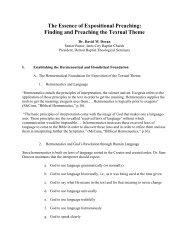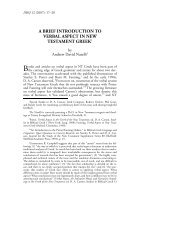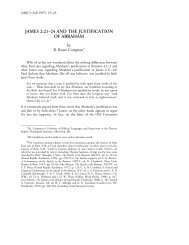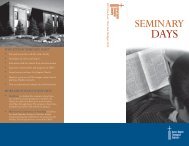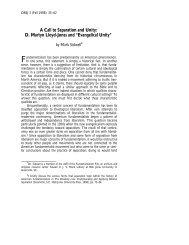Dispensational Sanctification: A Misnomer - Detroit Baptist ...
Dispensational Sanctification: A Misnomer - Detroit Baptist ...
Dispensational Sanctification: A Misnomer - Detroit Baptist ...
You also want an ePaper? Increase the reach of your titles
YUMPU automatically turns print PDFs into web optimized ePapers that Google loves.
<strong>Dispensational</strong> <strong>Sanctification</strong> 99<br />
Charles Ryrie boils down dispensationalism into three essential<br />
distinctives that he calls the sine qua non: 1) a distinction between national<br />
Israel and the church; 2) a hermeneutical method of literal interpretation;<br />
and 3) a doxological purpose of God in His dealings with<br />
man. 19<br />
John MacArthur, Jr. defines dispensationalism as “a system of biblical<br />
interpretation that sees a distinction between God’s program for<br />
Israel and His dealings with the church.” 20 He goes on to say that the<br />
central issue in dispensationalism is eschatology; he also suggests that<br />
dispensationalism has many implications for ecclesiology. 21<br />
Craig Blaising and Darrell Bock describe dispensationalism as a<br />
“futurist premillennialism that has strongly maintained the imminent<br />
return of Christ and a national and political future for Israel.” 22 Also, it<br />
is characterized by a “canonical approach to Scripture that interprets<br />
discontinuities of the Old and New Testaments as historical changes in<br />
divine-human dispensations reflecting different purposes in the divine<br />
plan.” This last point results in an emphasis on unique features in<br />
grace that belong to the present dispensation of the church. 23<br />
Robert Saucy states, “Anyone who asserts not only the restoration<br />
of Israel as a national entity but also a future role for that nation in<br />
God’s kingdom program has been generally identified as a dispensationalist.”<br />
24<br />
This succinct statement from Herb Bateman provides his assessment<br />
of the essence of dispensationalism: “Simply put, the basic unifying<br />
issue for all dispensationalists is that Israel is not the church.” 25<br />
Finally, John Feinberg presents six “core” items that are distinctive<br />
to dispensationalism: 1) the recognition of multiple senses for terms<br />
19<br />
Ryrie, <strong>Dispensational</strong>ism Today, pp. 44–47.<br />
20 John MacArthur, Jr., Faith Works: The Gospel According to the Apostles (Dallas:<br />
Word Publishing, 1993), p. 219.<br />
21 Ibid., p. 222.<br />
22<br />
Craig A. Blaising and Darrell L. Bock, “<strong>Dispensational</strong>ism, Israel and the<br />
Church: Assessment and Dialogue,” in <strong>Dispensational</strong>ism, Israel and the Church: The<br />
Search for Definition, ed. Craig A. Blaising and Darrell L. Bock (Grand Rapids: Zondervan,<br />
1992), p. 379.<br />
23 Ibid.<br />
24<br />
Robert L. Saucy, The Case for Progressive <strong>Dispensational</strong>ism: The Interface Between<br />
<strong>Dispensational</strong> and Non-<strong>Dispensational</strong> Theology (Grand Rapids: Zondervan,<br />
1993), p. 9.<br />
25 Herbert W. Bateman IV, “<strong>Dispensational</strong>ism Tomorrow,” in Three Central Issues<br />
in Contemporary <strong>Dispensational</strong>ism: A Comparison of Traditional and Progressive<br />
Views, ed. Herbert W. Bateman IV (Grand Rapids: Kregel, 1999), p. 308.



